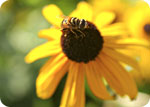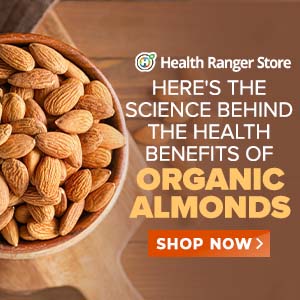
Flowers' Fragrance Diminished by Air Pollution
Wednesday, April 16, 2008 by: Leslee Dru Browning
Tags: honeybees, health news, Natural News
- European Court of Justice: Healthcare professionals who promoted or administered COVID-19 vaccines are CRIMINALLY LIABLE for any harm caused
- Oncologist warns of ‘terrifyingly aggressive’ cancers in children, linked to immune suppression from COVID vaccines
- Newly released JFK files reveal Pentagon's role in creating Lyme disease and covid in the same lab
- Ancient kitchen secrets REVEALED: How garlic, ginger and green onions fight cancer and heart disease
- Britain’s descent into police state censorship: Parents raided for questioning their daughter’s school system online
- NIH study, buried for decades, reveals that Flu Shots INCREASE elderly deaths, not prevent them
- COVID-19 scandal linked to CANCER SURGE: Billionaire researcher sounds alarm
- DARPA: The shadowy innovator behind the world’s most advanced military technologies
- “Old Man in a Chair”: The COVID-19 pandemic was a carefully orchestrated scheme for global control
- Decentralize TV: Dr. Leonard Coldwell reveals shocking, heavily censored truths about CANCER, healing and the medical mafia complex
- Musk targets “strangely wealthy” lawmakers in DOGE probe, names Pelosi, McConnell, Schumer
- RFK Jr. is reforming Americans’ health: A shift in power and paradigm
- Utah governor allows ban on LGBT pride flags in public buildings and schools, will take effect without his signature
- Cinnamon plays a critical role in diabetes management
- FRAUD ALERT: Details DEMOCRATS do NOT want you to know about the $40 BILLION wasted on Fed-loaded credit cards cancelled by DOGE
- Scientists unveil breakthrough method to eliminate "Forever Chemicals" from water, transforming waste into graphene
- RFK Jr. is pushing Big Pharma ad ban - and corporate media is panicking
- Massive egg substitution recall: Bleach contamination sparks nationwide concern
- Newly released JFK files reveal Pentagon's role in creating Lyme disease and covid in the same lab
- CDC finally halts $11 billion COVID funding scam as health officials admit the ‘pandemic’ was a fraud
- Analysis: The coming economic collapse, a mass uprising and Trump's three secret weapons to halt the growing revolt
- Kiss Your Genetic Privacy Good-Bye! 23andMe Gets Green Light to Sell Your Intimate Genetic Details to Anyone They Want
- Dr. Suzanne Humphries makes bombshell appearance on Joe Rogan podcast, exposing vaccine industry deception back to POLIOMYELITIS
- DEADLY DECEPTION: How COVID vaccines increased mortality rates and why authorities hid the truth
- Woman contracts WORLD'S DEADLIEST VIRUS after unknowingly being given the WRONG VACCINE
- Oncologist warns of ‘terrifyingly aggressive’ cancers in children, linked to immune suppression from COVID vaccines
- Here are TEN all-natural ways to protect your garden without using harmful chemicals
- Black cumin seed oil emerges as a powerful ally against breast cancer and chronic inflammation
- The hidden dangers in your kitchen: How cooking methods impact diabetes, cancer and aging
- Trump's greatest betrayal so far: Accelerating Middle East wars, silencing dissent, and serving Zionist masters
- Senate Democrats deny censorship industrial complex existed, defend government's role in silencing dissent
- Sugar-free deception: Artificial sweeteners hijack hunger signals, fuel obesity epidemic, study warns
- “Independent” anti-Russia outlet MEDUZA faces COLLAPSE as US funding dries up
- NIH study, buried for decades, reveals that Flu Shots INCREASE elderly deaths, not prevent them
- The Health Ranger releases “Vaccine Zombie” song and music video, using AI-animated zombies for the music video
- Discovery of vast underground city beneath Giza pyramids challenges human history
- Newly released JFK files reveal Pentagon's role in creating Lyme disease and covid in the same lab
- California's social media censorship law struck down: A victory for free speech or a threat to online safety?
- EPA advisor admits the agency is funneling billions to climate groups ahead of Trump’s return to White House
- The Health Ranger releases “Vaccine Zombie” song and music video, using AI-animated zombies for the music video
- Dr. Mike Yeadon releases 15-minute testimony - WATCH - about genocidal intent of COVID “vaccines”
- Florida takes a stand: DeSantis proposes permanent ban on mRNA vaccine mandates
- Mike Adams releases country western hit single: Goin’ Back in Time is Comin’ Home
- “Why we influenced the 2020 elections”: Facebook files reveal the coordinated effort to bury the Hunter Biden laptop story
- Unpacking the Lies That We’ve Been Fed – new song and music video released by Mike Adams, the Health Ranger
- House Intelligence Committee calls for the ARREST and PROSECUTION of Dr. Anthony Fauci
- The pandemic as a tool for INDOCTRINATION: Understanding “The Indoctrinated Brain” by Dr. Michael Nehls
- Rep. Nancy Mace introduces bill to ban biological males from female facilities on federal property
- Mike Adams releases music poetry sensation: A Child of God
- Sugarcane extract superior to cholesterol-lowering drugs?
- Survival 101: Effective EMF blocking techniques
- Michigan sheriff announces criminal investigation into 2020 election crimes, Dominion Voting Systems
- Peter Rost exposes Big Pharma corruption in his book “The Whistleblower: Confessions of a Healthcare Hitman”
- Migrants are taking advantage of recent hurricanes to scam residents and loot their homes
- Red Cross issues warning to stop blood plasma donations from vaccinated people
- Scientists confirm: GENIUS brain function can be spontaneously unleashed in humans without any apparent cause
- EPA advisor admits the agency is funneling billions to climate groups ahead of Trump’s return to White House
- HYSSOP: What research reveals about the health benefits of this ancient holy herb
- Two containers with completed ballots fall out of truck in Florida
- Fully vaccinated about to see “tsunami” of illness and death, warns virologist
- Global leaders unite to clamp down on “misinformation” with UN-backed Cascais Declaration
- BREAKING: 2025 NDAA authorizes mandatory military draft of WOMEN across America… as Pentagon pursues global NUCLEAR war with both Russia and China at the same time
- Michael Yon warns of a ZIONIST TAKEOVER in Trump’s second administration
- BOMBSHELL: DNA testing kits are a SCAM to develop ethnic-specific bioweapons
- Ozempic and Wegovy weight loss drugs are injectable LIZARD VENOM PEPTIDES that may unleash a devastating wave of organ failure… side effects align with symptoms of SNAKE BITES
- Israeli soldiers accused of even more torture and abuse in the West Bank
- These 13 countries just signed an agreement to engineer a global FAMINE by destroying food supply
- NASA admits that climate change occurs because of changes in Earth’s solar orbit, and NOT because of SUVs and fossil fuels
- RFK Jr. clears key hurdle: Sen. Susan Collins backs controversial HHS nominee, signaling a new era for health policy
- Sermon 30: How Jesus reveals Caesar’s FAKE CURRENCY and FALSE AUTHORITY
- Coriander seeds: Ancient medicine backed by modern science
- Arizona officials claim Maricopa County needs 10-13 days to tabulate results of the election
Air pollution from power plants and automobiles is destroying the fragrance of flowers and thereby inhibiting the ability of pollinating insects to follow scent trails to their source, a new University of Virginia study indicates. This could partially explain why wild populations of some pollinators, particularly bees –- which need nectar for food –- are declining in several areas of the world, including California and the Netherlands. The study appears online in the journal Atmospheric Environment.
"The scent molecules produced by flowers in a less polluted environment, such as in the 1800s, could travel for roughly 1,000 to 1,200 meters; but in today's polluted environment downwind of major cites, they may travel only 200 to 300 meters," said Jose D. Fuentes, a professor of environmental sciences at the University of Virginia and a co-author of the study. "This makes it increasingly difficult for pollinators to locate the flowers."
The result, potentially, is a vicious cycle where pollinators struggle to find enough food to sustain their populations, and populations of flowering plants, in turn, do not get pollinated sufficiently to proliferate and diversify.
Other studies, as well as the actual experience of farmers, have shown that populations of bees, particularly bumblebees, and butterflies have declined greatly in recent years. Fuentes and his team of University of Virginia researchers, including Quinn McFrederick and James Kathilankal, believe that air pollution, especially during the peak period of summer, may be a factor.
To investigate this, they created a mathematical model of how the scents of flowers travel with the wind. The scent molecules produced by flowers are very volatile and they quickly bond with pollutants such as ozone, hydroxyl and nitrate radicals, which destroy the aromas they produce. This means that instead of traveling intact for long distances with the wind, the scents are chemically altered and the flowers, in a sense, no longer smell like flowers. This forces pollinators to search farther and longer and possibly to rely more on sight and less on smell.
The scientists calculated scent levels and distances that scents can travel under different conditions, from relatively unpolluted pre-industrial revolution levels, to the conditions now existing in rural areas downwind from large cities.
"It quickly became apparent that air pollution destroys the aroma of flowers, by as much as 90 percent from periods before automobiles and heavy industry," Fuentes said. "And the more air pollution there is in a region, the greater the destruction of the flower scents."
The National Science Foundation funded the investigation.
I, myself, have often wondered if air pollution may be the underlying cause of many of the new emerging chronic debilitating diseases like fibromyalgia, childhood asthma and other illnesses that seem to have proliferated in the last 20 years.
Sources:
Newswise (http://www.newswise.com:80/articles/view/539...)
University of Virginia News Source (http://www.virginia.edu/)
About the author
Leslee Dru Browning is a 6th generation Medical Herbalist & Nutritionist from the ancestral line of Patty Bartlett Sessions; Pioneer Mid-Wife & Herbalist. Leslee practiced Medical Herbalism and Nutritional Healing for over 25 years and specialized in Cancer Wellness along with Chronic Illness. She now devotes her career to teaching people, through her writing, about Natural Healing from An Herbal Perspective.Honeybees at FETCH.news
Get independent news alerts on natural cures, food lab tests, cannabis medicine, science, robotics, drones, privacy and more.
Take Action: Support Natural News by linking to this article from your website
Permalink to this article:
Embed article link: (copy HTML code below):
Reprinting this article:
Non-commercial use OK, cite NaturalNews.com with clickable link.
Follow Natural News on Facebook, Twitter, Google Plus, and Pinterest
Science News & Studies
Medicine News and Information
Food News & Studies
Health News & Studies
Herbs News & Information
Pollution News & Studies
Cancer News & Studies
Climate News & Studies
Survival News & Information
Gear News & Information
News covering technology, stocks, hackers, and more



"Big Tech and mainstream media are constantly trying to silence the independent voices that dare to bring you the truth about toxic food ingredients, dangerous medications and the failed, fraudulent science of the profit-driven medical establishment.
Email is one of the best ways to make sure you stay informed, without the censorship of the tech giants (Google, Apple, Facebook, Twitter, YouTube, etc.). Stay informed and you'll even likely learn information that may help save your own life."
–The Health Ranger, Mike Adams












































